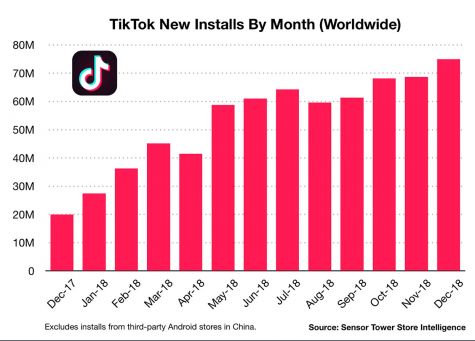The History of TikTok
January 4, 2021
Nicole Vital (’22)
Tik Tok: an app almost everyone in 2020 is familiar with and an app that most everyone uses. As of October, Tik Tok estimates that it has about 850 million active monthly users, 41 million of those users being from the United States. Also released in October, Tik Tok is the third most used app among teenagers with 69% engagement, up nearly 7% since Spring 2020. The app has seen huge success, making 5.6 billion dollars in only the first quarter of 2020 which has been a huge uptick from the 3 billion dollar profit the app made in 2019. Quarantine has been hugely beneficial for the app as well, drawing the attention of bored internet users across the world. However, what may seem like an overnight success has actually been in the works for many years, building to reach the current popularity that we see today. Tik Tok has slowly grown since 2014, starting life as the lip-syncing app known as Musical.ly.
Tik Tok began in Shanghai, launched by two entrepreneurs, Alex Zhu and Luyu Yang. The app was successful in China, and had strong links to the U.S. market as well. Musical.ly began as a 15 second lip-syncing platform. Musical.ly, unlike the current version of Tik Tok, did not feature much original content. The biggest creators on the platform were known for lip syncing and video clip transitions as well as edits that came with them. In 2016, while Musical.ly continued to perform well on the U.S. app store, Chinese tech giant ByteDance launched a specific service much like Musical.ly, only for Chinese users. The new app was called Douyin and attracted 100 million users in China as well as Thailand in the course of a year. ByteDance then decided to expand further under rebranding, the new brand name being Tik Tok. With the sudden success of Douyin, ByteDance was able to purchase Musical.ly from Zhu and Yang and completely transform the platform into the social media giant it is today.

Tik Tok’s massive success in the U.S. since its rebrand in 2018 has raised security questions that recently came to life, particularly this April. The Trump administration was particularly wary of it, because of its Chinese ownership and the legal issues regarding how much access the Chinese government had to U.S. user data along with U.S. content moderation. In an effort to appease the U.S. government, ByteDance hired a new CEO, Kevin Mayer, who is an American ex-Disney executive.
However, threats of a ban still persisted from the Trump administration, unless the app could close a deal with an American company Microsoft being the favored buyer. The sale saga continued for many months with multiple top buyers getting involved including Walmart and Oracle, a tech company highly endorsed by Trump. Eventually, a partnership deal was struck by Walmart, Oracle and ByteDance, where Oracle took a 12.5% stake and now holds all U.S. user data to comply with security standards. Walmart also has a 7.5% stake, while ByteDance still remains the majority shareholder of the company. The deal was agreed upon in September after many ban threats from the president.
Musical.ly created a new crop of influencers for audiences to look up to. These creators gathered millions of followers for lip syncing videos, some of the most well known names on the app being Jacob Sartorius, Cameron Dallas, Jojo Siwa, Mackenzie Ziegler, and Baby Ariel (to name a few). Tik Tok has created a similar generation of influencers, known primarily for dancing. TikTokers like Charli D’Amelio, Chase Hudson, Addison Rae, Bryce Hall, and Noah Beck have gained huge platforms with millions of followers. Charli D’Amelio recently made headlines acquiring 100 million followers, surpassing many other creators on the app. These Tik Tok stars have also gained a presence on a variety of platforms including YouTube and Instagram. Content houses have been created across the world including the Hype and Sway houses based in Los Angeles and the Wave House, featuring British creators based in England.
Clearly, Tik Tok is not going away. It is an unconventional platform that could give any user a voice and a large following. The Tik Tok algorithm is the key reason for its success, giving users a unique for you page created by the videos that the user likes, comments on, and shares. The for you page, combined with the user created following page built upon the accounts the user follows make for hours of addicting entertainment that make it hard to close the app and easy to keep scrolling through. It’s success is globally recognized as Instagram and Snapchat have copied the unique format to make reels (on Instagram) and the spotlight page (on Snapchat). Tik Tok’s popularity is set to continue soaring, garnering more downloads as more users share videos with family and friends. Only time will tell what’s next for this billion dollar social media superstar.